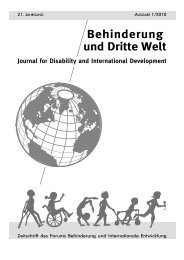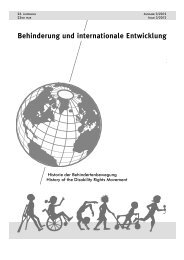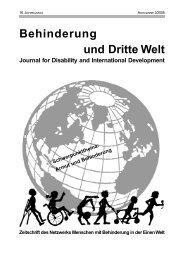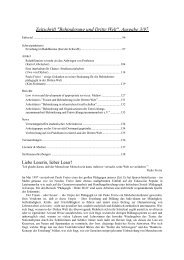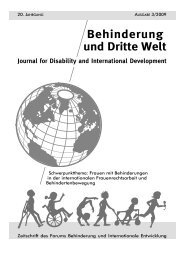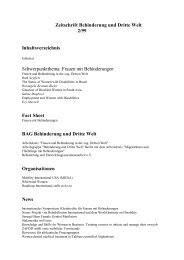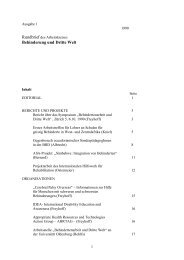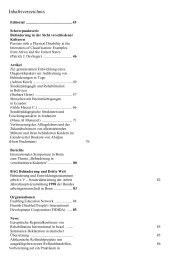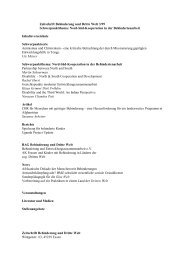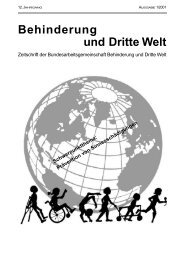Bundesarbeitsgemeinschaft Behinderung und Dritte Welt - Zeitschrift ...
Bundesarbeitsgemeinschaft Behinderung und Dritte Welt - Zeitschrift ...
Bundesarbeitsgemeinschaft Behinderung und Dritte Welt - Zeitschrift ...
Erfolgreiche ePaper selbst erstellen
Machen Sie aus Ihren PDF Publikationen ein blätterbares Flipbook mit unserer einzigartigen Google optimierten e-Paper Software.
Items Responses<br />
Courses offered<br />
by schools<br />
Facilities<br />
available<br />
Procedure for<br />
selecting<br />
trainees<br />
Period of<br />
training<br />
Basketry<br />
29<br />
(74.4%)<br />
Sheltered<br />
workshop<br />
0<br />
Formal<br />
assessment<br />
0<br />
tings where they will have the opportunity to integrate<br />
with other people who do not have disabilities.<br />
After their training in competitive employment settings<br />
it becomes easier for them to secure jobs in<br />
such environments.<br />
Additionally, it appears persons with disabilities are<br />
often placed in vocational training programmes<br />
without any type of support (Weisberger, Dahl &<br />
Appleby, 1980). Ideally, some individuals with mental<br />
retardation should be supported by job-coaches<br />
and other relevant personnel to ensure their success<br />
in acquiring requisite skills.<br />
Besides, vocational assessment is crucial in every<br />
individual with disabilities vocational training.<br />
Assessment provides relevant information on the<br />
individual’s capabilities and weaknesses to enable<br />
special educators and instructors to design appropriate<br />
training programmes for individual<br />
(McLoughlin & Lewis, 1990). Also, Astin, Hemond<br />
& Richardson (1982) reported that, some individuals<br />
with mild disabilities even have strong prognosis for<br />
success in post-school settings. The main problem to<br />
further improvement seems to lie in the transfer of<br />
training from educational contexts to adult-living<br />
environments. Schloss, Smith & Schloss (1990)<br />
added that, individuals with disabilities could possess<br />
higher level of basic academic skills, but they<br />
often appear poorly prepared to apply these skills to<br />
the demands of community life. To address this<br />
issue, the office of Special Education and Rehabili-<br />
<strong>Zeitschrift</strong> <strong>Behinderung</strong> <strong>und</strong> <strong>Dritte</strong> <strong>Welt</strong> 3/2001<br />
0-5<br />
0<br />
0<br />
Batik making<br />
13<br />
(33.3%)<br />
Rehabilitation<br />
centres<br />
0<br />
Informal<br />
assessment<br />
39<br />
100%<br />
Farming<br />
28<br />
(71.8%)<br />
Classroom<br />
30<br />
100%<br />
-<br />
6-10<br />
0<br />
0<br />
SCHWERPUNKTTHEMA<br />
Envelop making<br />
11<br />
(28.2%)<br />
tation Services of the United States (OSERS) for<br />
instance, has formulated guidelines on how to intervene<br />
through an on-going educational effort called<br />
transition service.<br />
Objective of the Study<br />
Among the objectives set was to ascertain if significant<br />
number of persons with mental retardation<br />
have completed training at special schools and<br />
secure jobs in competitive employment.<br />
Research Questions<br />
The questions raised included:<br />
- What types of vocational courses do special<br />
schools offer individuals with mental retardation?<br />
- How many individuals with mental retardation<br />
completed their training between 1992-1997 at<br />
the special schools in Ghana?<br />
Methodology<br />
A sample, comprising 36 special teachers, three<br />
vocational instructors and 15 persons with mental<br />
retardation was used. This sample was selected from<br />
a population of 45 special teachers and nine vocational<br />
instructors in the then eight special schools for<br />
the mental retardation in Ghana. A stratified random<br />
sampling technique was used to select the special<br />
schools. Out of the nine, four schools were selected.<br />
All the 36 special teachers in four schools were<br />
included in the study. Also, all the three vocational<br />
instructors of the four schools were used. A random<br />
-<br />
-<br />
Unspecified<br />
39<br />
100%<br />
1992 1993 1994 1995 1996<br />
Dzorwulu 2 0 0 0 0<br />
Twin City 2 0 0 0 0<br />
Garden City 0 0 0 0 0<br />
Three Kings 0 0 0 0 0<br />
Total 4 0 1 0 0<br />
Table 2: Responses to Questionnaire<br />
91



